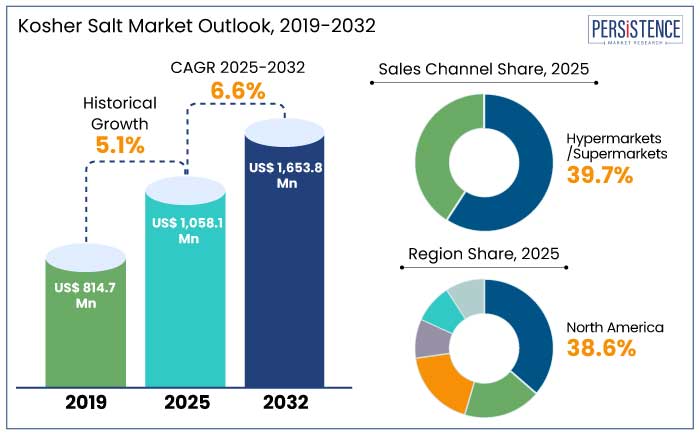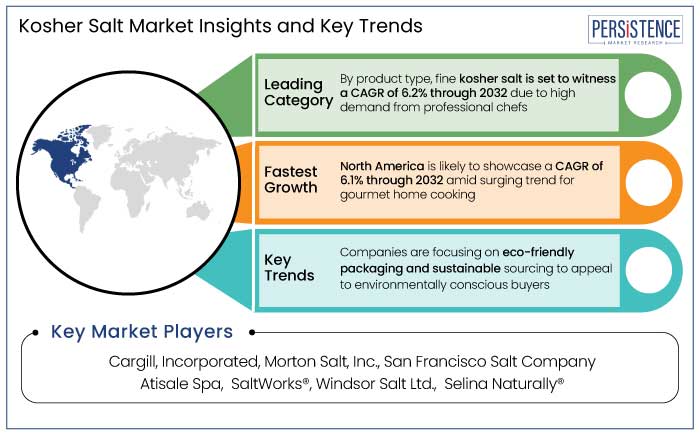Industry: Food and Beverages
Published Date: January-2025
Format: PPT*, PDF, EXCEL
Delivery Timelines: Contact Sales
Number of Pages: 192
Report ID: PMRREP12577
The global kosher salt market is set to be valued at US$ 1,058.1 Mn by 2025. It is projected to witness a CAGR of 6.6% during the assessment period and attain a value of US$ 1,653.8 Mn by 2032.
Today's shoppers are increasingly aware of the environmental issues in the food industry, including plastic waste and unsustainable sourcing. As consumer demand for environmentally responsible products rises, kosher salt companies have a prime opportunity to embrace sustainability.
By adopting biodegradable, recyclable, and minimalist packaging, brands can significantly reduce their environmental impact and attract eco-conscious consumers. By sourcing salt through sustainable methods like solar evaporation and responsibly managed salt mines, companies can also highlight their commitment to the planet.
Such initiatives not only resonate with environmentally conscious buyers but also help brands differentiate themselves in a competitive market. By prioritizing sustainability, kosher salt brands can build trust, enhance brand loyalty, and tap into a rising demographic that values eco-friendly practices. For example,

Key Highlights of the Industry
|
Market Attributes |
Key Insights |
|
Kosher Salt Market Size (2025E) |
US$ 1,058.1 Mn |
|
Projected Market Value (2032F) |
US$ 1,653.8 Mn |
|
Global Market Growth Rate (CAGR 2025 to 2032) |
6.6% |
|
Historical Market Growth Rate (CAGR 2019 to 2023) |
5.1% |
The established food processing industry in North America extensively utilizes kosher salt in various products, including packaged foods, snacks, and meat processing. Additionally, rising trend of gourmet home cooking and dining in restaurants has increased the preference for kosher salt among both chefs and consumers who value its coarse texture and flavor-enhancing qualities.
As more consumers become health-conscious and seek additive-free, minimally processed ingredients, awareness of kosher-certified products is rising. This trend aligns with the increasing popularity of organic and specialty salt variants in the U.S. and Canada.
Growth of retail and e-commerce sectors has further made premium and artisanal kosher salt products more accessible. These factors, combined with the presence of prominent food manufacturers and robust distribution networks, reinforce North America’s leading position in the market. It is anticipated that the region will hold a share of 38.6% in 2025 and witness a CAGR of 6.1% through 2032.
Fine kosher salt is projected to witness a CAGR of 6.2% through 2032. It has become a popular choice among both home cooks and professional chefs due to its ability to provide consistent and balanced seasoning across a variety of culinary applications.
Its fine, granular texture allows it to dissolve quickly, ensuring an even distribution of flavor in dishes. This makes it especially effective for seasoning prepared meals, sauces, soups, and even baked goods, where uniform seasoning is essential.
Fine kosher salt also offers a more controlled level of saltiness, allowing cooks to season dishes without the risk of over-salting. The purity of kosher salt, free from additives like iodine, further enhances its appeal, resulting in a clean, natural taste. Its versatility extends beyond cooking, as it is often used as a finishing touch for salads, meats, and other dishes. Furthermore, its smooth texture and easy handling make it a favorite choice for use in saltshakers or for sprinkling on finished meals.
Online retail platforms have become a key driver of kosher salt sales, catering to surging consumer demand for high-quality seasoning products. The segment is anticipated to witness a CAGR of 7.6% through 2032.
With the increasing shift toward e-commerce, consumers now have easier access to a variety of kosher salt options, including fine, flake, and coarse variants. The convenience of online shopping, combined with competitive pricing, bulk purchasing options, and direct-to-consumer delivery, has made it easier for both home cooks and professional chefs to source premium kosher salt.
Online retailers further provide detailed product descriptions, customer reviews, and comparisons, enabling informed purchasing decisions. Rise of subscription-based services and specialty food websites has also fueled growth. It helps in ensuring regular availability for consumers who prioritize quality and consistency in their culinary needs.
Digital platforms also allow manufacturers to broaden their reach beyond local markets, tapping into international demand. As more consumers embrace online shopping for specialty ingredients, e-commerce continues to drive steady growth of the global market.
The kosher salt market is poised for remarkable growth, propelled by a strong consumer preference for natural, minimally processed food ingredients. Renowned for its coarse texture and purity, kosher salt is essential in gourmet cooking and meat curing, perfectly aligned with rising demand for clean-label products that consumers trust.
A significant trend driving market growth is the push for premiumization. Modern consumers are actively seeking high-quality salts to innovate their home cooking and restaurant experiences.
Rising focus on healthy eating habits has further increased the desire for kosher salt. It is free from additives and artificial preservatives, thereby making it a smart choice for health-conscious individuals.
The foodservice industry plays a critical role in this growth, with chefs and food manufacturers choosing kosher salt for its ease of use and flavor-enhancing properties. North America and Europe currently lead the market, but Asia Pacific is experiencing high demand, due to rising influence of Western culinary practices.
Sustainability concerns are driving innovations, particularly in eco-friendly packaging and ethical sourcing. These are making kosher salt not just a flavorful addition, but a conscientious choice for the modern consumer.

The kosher salt market witnessed consistent growth from 2019 to 2023 at a CAGR of 5.1%. It was driven by increasing consumer awareness of clean-label and minimally processed food ingredients. The market also benefited from rising demand in the foodservice sector, where chefs prefer kosher salt for its superior texture and flavor-enhancing properties.
Surging home cooking, particularly during the COVID-19 pandemic, significantly boosted sales as consumers sought high-quality ingredients for gourmet meal preparation. North America, led by the U.S., has been the dominant force, with surging interest in kosher-certified products spreading into Europe and Asia Pacific.
From 2025 to 2032, the market is set to continue rising, driven by surging health consciousness and rising popularity of specialty salts. Demand for premium and organic kosher salts is particularly projected to rise in the gourmet and natural foods segments.
Sustainability concerns will likely encourage manufacturers to adopt eco-friendly packaging and ethical sourcing practices. Growth in emerging markets, alongside the surging use of salt in processed foods and seasoning blends, is set to create new opportunities. Additionally, technological innovations in salt harvesting and refining are anticipated to drive product innovation.
Surging Shift toward Organic and Unrefined Kosher Salt
The kosher salt market is experiencing significant growth due to rising consumer preference for organic and unrefined options. As health and wellness become a priority, several people are opting for natural, unprocessed ingredients. Unlike table salt, which often contains additives, kosher salt is harvested to maintain its purity and mineral content, making it a healthier choice that aligns with rising demand for clean-label products.
Organic kosher salt, sourced from mineral-rich seabed or salt mines, offers a sustainable alternative that appeals to environmentally conscious consumers. Popularity of organic foods is driving this shift, particularly in North America and Europe, where shoppers increasingly seek premium ingredients that reflect their ethical values and health goals. Consequently, demand for organic and unrefined kosher salt is set to rise, shaping the market’s future.
High Demand for Ethnic and Gourmet Cuisine
One of the main factors contributing to kosher salt's increasing appeal is the rising desire for gourmet and ethnic cuisine. Because of globalization and the ease with which other culinary traditions can now be accessed, people are experimenting with recipes that call for real ingredients and methods.
A key ingredient in making these recipes is kosher salt, which is prized for its unadulterated flavor and adaptability. For instance, it is a common ingredient in Middle Eastern and Mediterranean cooking, where it is used to season foods like falafels, grilled meats, and roasted vegetables. Similar to this, it is used in Asian fusion cooking as it can improve the flavor of stir-fries, marinades, and broths without overpowering delicate ingredients.
Easy Availability and Low Cost of Iodized Salt
The widespread availability and low cost of iodized salt pose a significant challenge to the kosher salt market. Iodized salt is commonly found in households worldwide due to its affordability, availability, and added health benefits, including the prevention of iodine deficiency. This makes it the preferred choice for various consumers, especially in developing markets where cost-effective food options are a priority.
The lower price point of iodized salt, along with its practical benefits, limits price-sensitive consumers' willingness to switch to more expensive alternatives like kosher salt. Additionally, iodized salt is widely used in food processing and the restaurant industry, further intensifying competition. Consequently, for kosher salt to overcome this obstacle, it must differentiate itself through quality and specific culinary advantages.
Collaborations with Culinary Experts to Increase Brand Visibility
Partnering with culinary experts offers a valuable opportunity for kosher salt market players to enhance brand visibility and build consumer trust. Renowned chefs, influencers, and food bloggers can effectively endorse kosher salt, highlighting its premium quality and culinary benefits.
As culinary trends increasingly emphasize high-quality and natural ingredients, collaborations with chefs can showcase the salt’s unique attributes, such as its texture and flavor-enhancing properties. These partnerships not only boost the brand's credibility but also foster authentic connections with consumers who trust the expertise of their favorite culinary personalities.
By aligning with respected professionals in the food industry, kosher salt brands can reach a broader, more engaged audience. It is ultimately set to help raise brand loyalty and push sales into a competitive market.
The competitive landscape of the kosher salt industry is influenced by leading players who are focusing on unique processing technologies, regulatory compliance, and nutritional enhancements. Companies are investing in refining techniques to produce high-purity kosher salt with a uniform texture and fewer impurities. Innovations in harvesting methods, such as solar evaporation and vacuum pan drying, are enhancing both product consistency and efficiency.
Adhering to regulations is a top priority for manufacturers, who ensure compliance with kosher certification standards and food safety regulations. Prominent brands are highlighting the mineral composition of their salts, marketing them as healthier alternatives to conventional table salt.
Companies are further adopting sustainable sourcing practices and eco-friendly packaging to attract health-conscious and environmentally aware consumers. Entry into online retail channels and premium product segments is further intensifying competition in the market, driving continuous innovation and growth.
Recent Industry Developments
|
Attributes |
Details |
|
Forecast Period |
2025 to 2032 |
|
Historical Data Available for |
2019 to 2023 |
|
Market Analysis |
US$ Million for Value |
|
Key Regions Covered |
|
|
Key Market Segments Covered |
|
|
Key Companies Profiled in the Report |
|
|
Report Coverage |
|
|
Customization and Pricing |
Available upon request |
By Product Type
By Application
By Sales Channel
Region
To know more about delivery timeline for this report Contact Sales

The market will likely be valued at US$ 1,653.8 Mn by 2032.
Fine kosher salt holds the maximum market share.
North America holds a prominent share of the kosher salt industry.
Few of the prominent industry players are Cargill, Incorporated, Morton Salt, Inc., SaltWorks®, Windsor Salt Ltd., Selina Naturally®, and McCormick & Company, Inc.
The industry is set to witness a CAGR of 6.6% through the forecast period.